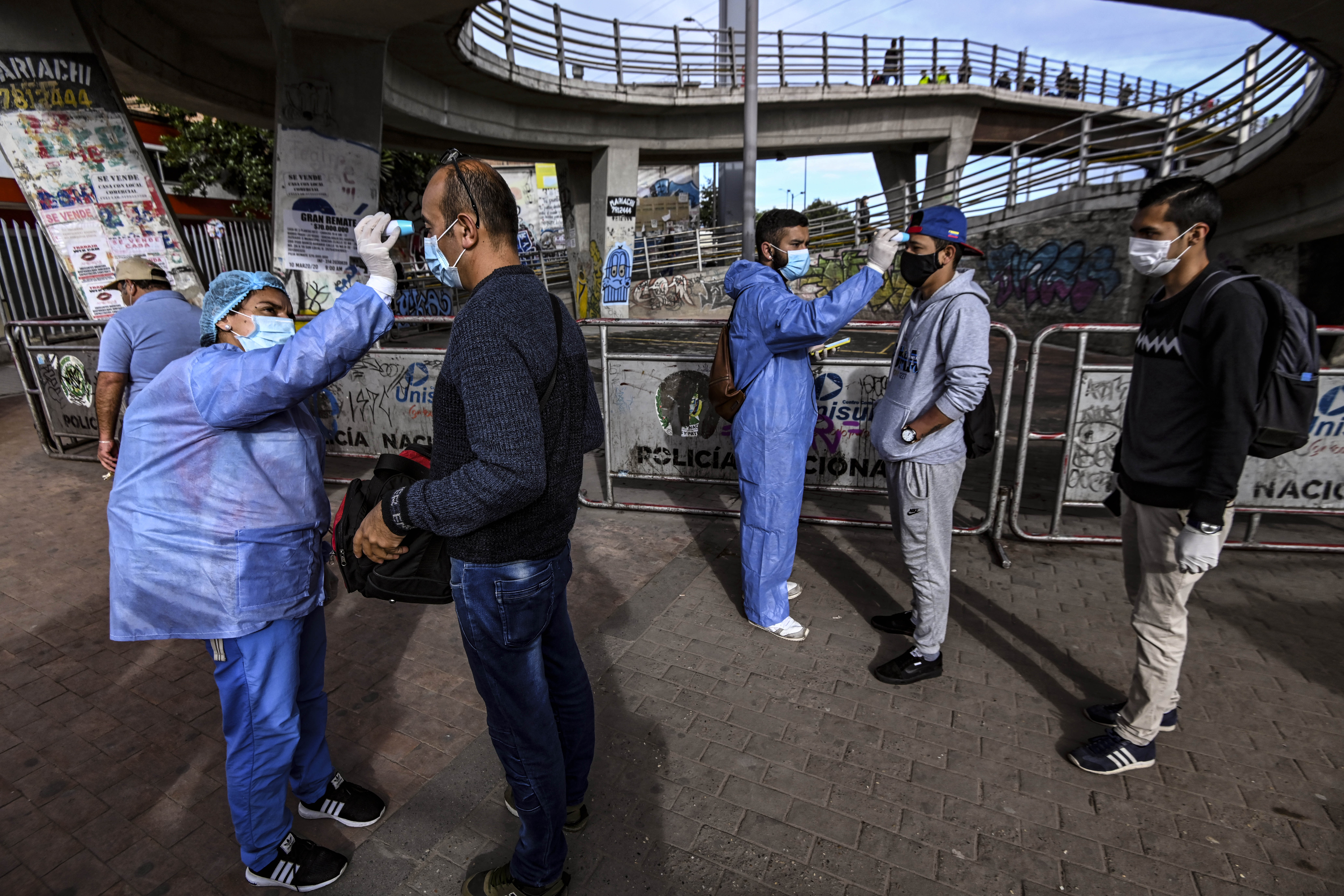UN predicts ‘deep recession’ in Latin America due to virus

People wear face masks as they get their temperature checked by health workers wearing protective suits as a preventive measure against the spread of the new coronavirus in Bogota, on April 2, 2020. – More than 20,000 cases of COVID-19 were registered in Latin America and the Caribbean by Wednesday — double the figure from five days ago, according to an AFP tally. (Photo by Juan BARRETO / AFP)
SANTIAGO, Chile — Latin America is heading into “a deep recession” in 2020, with an expected drop in the region’s GDP of 1.8 to 4.0 percent due to the coronavirus pandemic, the UN economic commission for the region said Friday.
“We are at the beginning of a profound recession. We’re faced with the largest fall in growth that the region has had,” said Alicia Barcena, executive secretary of the UN Economic Commission for Latin America and the Caribbean (CEPAL).
Latin America was already struggling economically, with feeble growth of just 0.1 percent in 2019.
As with other parts of the world, the region’s main stock markets have suffered drastic losses as the virus crisis escalates, and several currencies have plunged in value against the US dollar.
A reduction in economic activity due to lockdowns imposed to combat the spread of the virus, a drop in the value of raw materials and the blow to tourism have all contributed to the bleak outlook.
Article continues after this advertisementBarcena said the best-case projection takes into account only the drop in economic activity with China, the region’s largest trading partner.
Article continues after this advertisementBut if a drop in trade with the United States and European Union is also factored into the calculation, then a 3-4 percent contraction is expected.
‘A lot of pessimism’
Meanwhile, Mexico President Andres Manuel Lopez Obrador, who has been widely criticized for a lax approach to the pandemic, questioned projections of a recession, even contradicting his own finance ministry.
On Wednesday, the finance ministry cut its expectations for 2020 from the growth of 1.5 to 2.5 percent, down to a range of 0.1 percent growth to 3.9 percent contraction.
“I have other figures, other data, I’m talking about a temporary crisis, and that will allow us to move forward very soon,” he said.
“There’s a lot of pessimism in the world, especially among economy and finance leaders and experts … I don’t share that point of view.”
Lopez Obrador said it made no sense to make projections given the pandemic had created an abnormal situation economically as well as politically.
‘Extraordinary response’
Peru announced it would guarantee new bank loans to 350,000 businesses worth $8.5 billion so they can pay staff and suppliers.
Some 314,000 of the businesses have less than 10 employees, said President Martin Vizcarra, describing the program as “an extraordinary response to an extraordinary situation.”
‘Special plan’
Venezuela’s government announced a “special plan” against the fuel shortage due to the virus outbreak and tough U.S. sanctions.
The government has put into action “a special fuel supply plan aimed at guaranteeing the mobility of priority sectors,” said Tareck El Aissami, vice-president in the economic sector.
El Aissami didn’t specify what measures would be taken but said it was necessary because US sanctions had produced a shortage of essential supplies for fuel production.
Chartered flight
Around 160 European tourists left Nicaragua on a flight chartered by France as part of evacuations organized by the European Union to bring home citizens stranded by coronavirus lockdowns.
Most of the tourists leaving Nicaragua are French.
“It’s a one-off operation” to repatriate 130,000 French tourists stranded due to the grounding of airplanes all over the world, Philippe Letrilliart, France’s ambassador to Nicaragua, told AFP.
The passengers were provided with face masks and told that those exhibiting COVID-19 symptoms would be quarantined upon their arrival in France.
Around 600 tourists have left Nicaragua this week on flights chartered by France and Germany, EU Ambassador Pelayo Castro said.
Nicaragua has reported five coronavirus cases including one death.
Nicaragua has come under fire for not closing its borders or imposing social distancing measures. It’s also invited its citizens to visit tourist sites over the Easter week.
/MUF
For more news about the novel coronavirus click here.
What you need to know about Coronavirus.
For more information on COVID-19, call the DOH Hotline: (02) 86517800 local 1149/1150.
The Inquirer Foundation supports our healthcare frontliners and is still accepting cash donations to be deposited at Banco de Oro (BDO) current account #007960018860 or donate through PayMaya using this link.